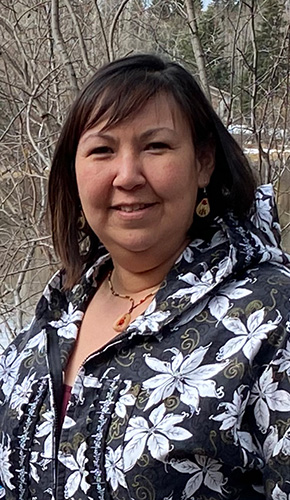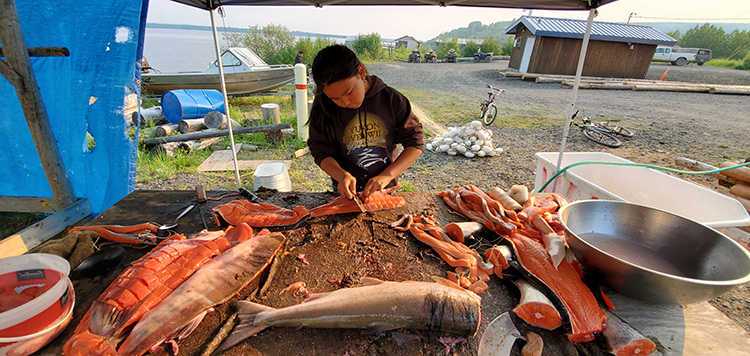Lands in Focus: Yukon River Drainage Fisheries Association
Presented by Calista Land & Natural Resources Department
Storyknife, July/August 2023 edition

Serena Fitka, courtesy YRDFA.
The Yukon River Drainage Fisheries Association (YRDFA) was created almost 35 years ago over concerns about the chinook salmon decline. Now, it’s in the middle of a widening salmon crisis that includes chum salmon.
Serena Fitka, a Calista Corp. Shareholder originally from St. Mary’s, joined the association as its executive director at the beginning of the COVID-19 pandemic and has guided it through four consecutive years of the salmon crisis.
“For me, it’s always been an uphill battle, with the pandemic and the fishery disasters,” Fitka says.
For this edition of Lands in Focus, we asked Fitka about what the Yukon River Drainage Fisheries Association is working on and what keeps her pushing forward.
There are a lot of fishery groups out there, and sometimes people get them confused. What is the purpose of YRDFA?
Our association began nearly 35 years ago when local people along the Yukon who were concerned about the chinook salmon decline decided that they needed to meet and work together. They were fed up with not being heard when management decisions were made.
The core reason we exist is to provide a communication link between the local people and the managers. Our river is so huge, and you get the pointing of fingers. We provide the opportunity for everyone to be at the table together.
We keep in mind one of the quotes from our elders, the late Sidney Huntington, who said at our first meeting, “OK, we’ve all said our piece, now what do we need to do to move forward.”
With the 4 consecutive years of salmon collapse, what is YRDFA focusing on?
Our board really wants to stay focused on addressing the areas we can control such as the Area M fishery, and the fact that our fisheries are collapsing.
It’s surprising that a lot of people even in Alaska don’t know how low our salmon numbers are. A lot of people don’t know what rural life is like, and the ripple effect of food security, the cost of fuel, and the overall cost of living on everything else. Getting the word out about our diminishing salmon returns is our most important activity right now.
What long-term projects are you working on?
We have the Yukon River pre-season meeting that happens at the end of April where we bring together representatives from each community and fishery managers to discuss the upcoming fishing season. We also host in-season teleconferences throughout the fishing season. Usually, it’s a time to share fishing observations, but since the local people haven’t been able to go fishing, we’ve been receiving reports and updates on issues such as trawler bycatch, the Area M fishery, and Yukon River-focused research.
We have a couple of big projects to support fisheries on the Yukon. One of them is a five-year project funded by the State of Alaska to get more traditional knowledge incorporated into western science. At the end of the project, we envision a map that allows anyone to see what data is already out there and identify research gaps with a traditional knowledge focus. This is our dream project in partnership with the Yukon River Inter-Tribal Watershed Council, and we think it is going to be a breakthrough project.
Another project is a watershed ecosystem action plan for the Yukon River. We are partnering with the U.S. Fish and Wildlife Service to look at fish passage, culverts and areas in the communities where work needs to be done. We’re hoping by the end of the fiscal year [July 2024] to have an action plan for the entire watershed.
The salmon crisis has been difficult for a lot of people. What keeps you motivated?
It’s been an uphill battle, with the pandemic and then the fishery disasters. What gets me going are my daughters. I want to make sure they have salmon in the future.
Apart from family, what helps carry me is the people in our region who have offered their support and encouragement to keep up the good work.

Calista Corporation President/CEO Andrew Guy provides his thoughts on the decline in salmon runs in the Yukon-Kuskokwim Region.